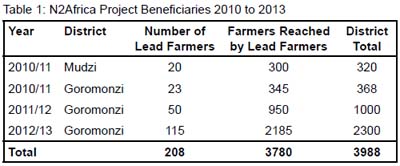Introduction
Cluster Agricultural Development Services (CADS) is a registered NGO whose work dates back to over 20 years when its predecessor VeCo Zimbabwe implemented programmes on sustainable agriculture and livestock production in Zimbabwe. CADS works with disadvantaged rural smallholder farmer organisations and its focus is to facilitate sustainable institutional strengthening, technology development, good agronomic practices, food processing, and input and output marketing. Integrated crop and livestock production, agroforestry and value addition are some of the major programmes in CADS’ sustainable livelihoods development portfolio.
In its development work CADS mainstreams gender, nutrition, HIV and AIDS, and income generation in order to help mitigate, not only the impact of the HIV and AIDS pandemic, but also the cycle of poverty affecting rural households. To achieve maximum impact CADS networks with relevant stakeholders for the provision of technical and extension support services required by farmer syndicates.
|
Nitrogen Fixation Project and Activities Since 2010/11 agricultural season, CADS and Centro Internacional de Agricultura Tropical (CIAT) through its Tropical Soil Biology and Fertility Institute (TSBF) in Harare are together implementing the research-based N2Africa Project in Zimbabwe. The project develops, disseminates and promotes appropriate nitrogen (N2)-fixation technologies for smallholder farmers and focuses on grain legumes (soyabeans, sugar beans, cowpeas and groundnuts). Fig1: Ground nuts harvesting-A-Frame Mudzi |
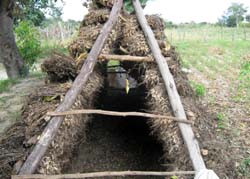 |
The N2Africa project fits in very well with CADS’ overall participatory intervention approach that emphasizes the following aspects; community and stakeholder involvement, capacity building of farmer organisations, development of new technologies that enhance soil fertility and increased yields, value addition and market linkages, mainstreaming of gender, nutrition, HIV and AIDS, mentorship, income generation and ability to spread project benefits to more members in the community.
CADS was responsible for the following activities for the N2Africa project; awareness raising, beneficiary selection, verification, registration, input distribution, establishment of demonstration sites, training of farmers in good agronomic practices, establishment of farmer groups, farmer field days, post-harvest handling and management, value addition and marketing.
The project used the Lead Farmer approach. Each lead farmer worked with an agreed group of mentored farmers who in turn cascaded knowledge and skills gained to non-beneficiary farmers. On the whole, nitrogen fixation programmes implemented in Mudzi and Goromonzi districts for the period 2010 to 2013 directly benefitted a total of 3988 farmers as shown in Table 1 below.
|
On the right: Fig 2: Drama performance, Chinyika ward 16, Goromonzi |
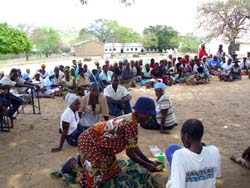 |
Main project achievements
Farmers indicated an improved level of knowledge, increased yields and the need to increase hectarage in the production of leguminous crops. Introduction of the project complemented other CADS projects related to conservation agriculture (FAO), livestock production and fodder production (FAO, ILRI). Apart from nitrogen fixation, farmers ‘suddenly’ had another source of material for livestock feeds, value addition and income generation. This provides positive sustainability and out-scaling of these crop varieties and associated inoculation technology. The existence of these symbiotic projects provides further room for growth of these legume crops.
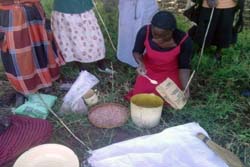 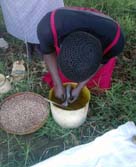 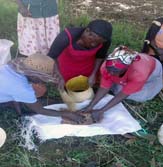
Fig 3: A Lead farmer, Mrs Marimo, demonstrating the inoculation process, Goromonzi 2011 |
Further examples of project achievements are shown below:
- Training of farmers on seed multiplication, resulting in, for example, harvesting of 350kg/farmer for sugar beans and 60 kg/farmer cowpeas during 2011/12 agriculture season.
- Provision of needed financial resources for farmer groups through establishment of Internal Savings and Lending (ISAL) for 24 farmer groups in Goromonzi district.
- Integration of small livestock into the N2Africa project has resulted in reduction of stock feed costs for poultry. A group of 20 farmers in Goromonzi are now using home grown soyabean feed formulation as a result of the N2Africa project.
- Commercialization of value addition wherein a group of 40 members in Goromonzi is running a value addition food shop at Juru Growth Point.
- Farmers benefited from a loan facility to expand their project resulting in some farmers expanding soyabean production to 2 ha (from the initial 0.05ha). The loans were repaid after harvesting.
- Farmer syndicates are now in a position to link directly with manufacturers of inoculants in the country.
- Farmers are now in a position to produce and sell legume seeds in the community.
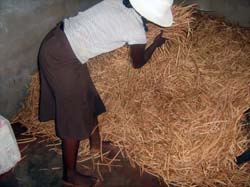 |
 |
Fig 4: Harvesting and processing of cowpeas, ward 2 Goromonzi
|
Ongoing Collaboration
Given the existence of complementary projects in Goromonzi, the N2Africa project can play an instrumental role in assisting farmers to grow legumes productively and sustainably.
The project provided training materials that were very useful for training and extension work. These materials can be further improved to take into account the extended needs for farmers, climate change, new research findings, nutritional challenges and changing consumer needs.
N2Africa and CADS can explore further collaboration in capacity building at the level of the organization as well as approaches to community development such as lead farmer training and improvements for demonstration plots, providing technical support.
Conclusion
The combination of theory and practical demonstrations were effective as farmers were able to learn from their peers and from technical staff. Farmers also learnt new technologies such as the use of inoculants and single super phosphate (SSP) in legume production and how legumes enhance soil fertility as well as provide protein for families.
An additional benefit of the N2Africa project is the use of these legumes (stalks and leaves) for fodder production for dairy and beef farmers. This extended product role of legumes has resulted in more farmers taking the initiative to expand on crop hectarage for these crops given their multiple role in enhancing soil fertility, arresting land degradation, providing needed nutrition, and animal fodder.
Mrs Lillian Machivenyika

